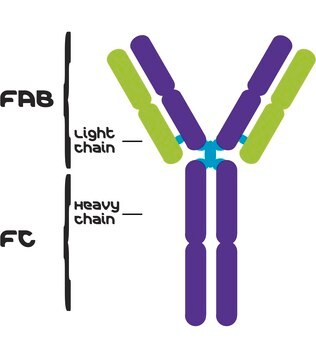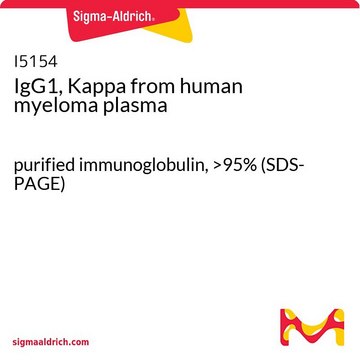401116
Human IgG, Fab Fragment, Plasma
Synonym(e):
IgG Fab fragment
Anmeldenzur Ansicht organisationsspezifischer und vertraglich vereinbarter Preise
Alle Fotos(1)
About This Item
UNSPSC-Code:
12352202
NACRES:
NA.77
Empfohlene Produkte
Assay
≥95% (SDS-PAGE)
Qualitätsniveau
Form
liquid
Hersteller/Markenname
Calbiochem®
Lagerbedingungen
OK to freeze
Löslichkeit
sterile distilled water: soluble
Versandbedingung
ambient
Lagertemp.
−20°C
Posttranslationale Modifikation Target
unmodified
Allgemeine Beschreibung
Immunoglobulin G (IgG) is the most crucial glycoprotein antibody. It has the longest serum half-life compared to other immunoglobulins. IgG is present in human serum and also identified in the bloodstream. It contains four polypeptide chains, wherein the light and heavy chains are linked by disulfide bonds.
Anwendung
Human IgG, Fab Fragment, Plasma has been used in enzyme-linked immunosorbent assay (ELISA).
Biochem./physiol. Wirkung
Immunoglobulin G (IgG) initiates the classical pathway of the complement system and eliminates virus particles and toxins. It controls antibody-dependent cell-mediated cytotoxicity (ADCC) and might be correlated to allergy. Digestion of IgG by papain generates fragment antigen-binding (Fab) whereas pepsin digestion of IgG releases crystallizable (Fc) fragment and a single dimeric F(ab)2. Maternal IgG is transferred to the fetus via the placenta and is crucial for the immune defense of the neonate against infections. IgG levels in severe acute respiratory syndrome coronavirus (SARS-CoV)2 infected patients may be useful to understand the severity and prognosis of coronavirus disease 2019 (COVID-19).
Warnhinweis
Toxicity: Standard Handling (A)
Physikalische Form
In 150 mM NaCl, 20 mM sodium phosphate buffer, 0.05% NaN₃, pH 7.4.
Angaben zur Herstellung
Prepared from plasma that has been shown by certified tests to be negative for HBsAg and for antibodies of HIV and HCV.
Rekonstituierung
Following reconstitution, aliquot and freeze (-20°C). Stock solutions are stable for up to 6 months at -20°C.
Rechtliche Hinweise
CALBIOCHEM is a registered trademark of Merck KGaA, Darmstadt, Germany
Haftungsausschluss
RESEARCH USE ONLY. This product is regulated in France when intended to be used for scientific purposes, including for import and export activities (Article L 1211-1 paragraph 2 of the Public Health Code). The purchaser (i.e. enduser) is required to obtain an import authorization from the France Ministry of Research referred in the Article L1245-5-1 II. of Public Health Code. By ordering this product, you are confirming that you have obtained the proper import authorization.
Lagerklassenschlüssel
12 - Non Combustible Liquids
WGK
nwg
Flammpunkt (°F)
Not applicable
Flammpunkt (°C)
Not applicable
Analysenzertifikate (COA)
Suchen Sie nach Analysenzertifikate (COA), indem Sie die Lot-/Chargennummer des Produkts eingeben. Lot- und Chargennummern sind auf dem Produktetikett hinter den Wörtern ‘Lot’ oder ‘Batch’ (Lot oder Charge) zu finden.
Besitzen Sie dieses Produkt bereits?
In der Dokumentenbibliothek finden Sie die Dokumentation zu den Produkten, die Sie kürzlich erworben haben.
S G Johansson et al.
Allergy, 56(9), 813-824 (2001-09-12)
This report has been prepared by an EAACI task force representing the five EAACI Sections and the EAACI Executive Committee composed of specialists that reflect the broad opinion on allergy expressed by various clinical and basic specialties dealing with allergy.
Harry W Schroeder et al.
The Journal of allergy and clinical immunology, 125(2 Suppl 2), S41-S52 (2010-03-05)
Immunoglobulins are heterodimeric proteins composed of 2 heavy and 2 light chains. They can be separated functionally into variable domains that bind antigens and constant domains that specify effector functions, such as activation of complement or binding to Fc receptors.
Hongyan Hou et al.
Clinical & translational immunology, 9(5), e01136-e01136 (2020-05-10)
This study aimed to determine the IgM and IgG responses against severe acute respiratory syndrome coronavirus (SARS-CoV)-2 in coronavirus disease 2019 (COVID-19) patients with varying illness severities. IgM and IgG antibody levels were assessed via chemiluminescence immunoassay in 338 COVID-19
Gestur Vidarsson et al.
Frontiers in immunology, 5, 520-520 (2014-11-05)
Of the five immunoglobulin isotypes, immunoglobulin G (IgG) is most abundant in human serum. The four subclasses, IgG1, IgG2, IgG3, and IgG4, which are highly conserved, differ in their constant region, particularly in their hinges and upper CH2 domains. These
Unser Team von Wissenschaftlern verfügt über Erfahrung in allen Forschungsbereichen einschließlich Life Science, Materialwissenschaften, chemischer Synthese, Chromatographie, Analytik und vielen mehr..
Setzen Sie sich mit dem technischen Dienst in Verbindung.







